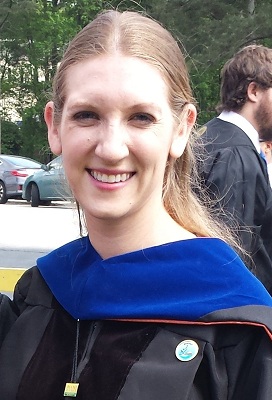Post-Baccalaureate Certificate in Biomedical Sciences
The Post-Baccalaureate Certificate in Biomedical Sciences offers enhanced preparation beyond the undergraduate level for aspiring professionals in fields such as medicine, dentistry, pharmacy, veterinary science, physical therapy, laboratories, and biomedical technology. The certificate is designed to supplement, rather than replace, the necessary prerequisites for professional programs, ensuring that students are well-equipped with advanced knowledge and skills critical for success in their chosen careers. Students can complete the certificate in 1-3 semesters with flexible learning options, including in-person, fully online, or partially online formats, allowing them to tailor their education to fit their individual needs and schedules. Successful certificate students may apply their earned credits towards a non-thesis Master of Science in Biology, Biomedical Sciences Concentration.
A program sheet, which provides a required coursework sequence, is available for download in the Courses tab below.
All earned certificate credits can be applied toward the UWG Master of Science in Biology degree.
Program Location
Carrollton Campus
Method of Delivery
Students can complete the certificate in 1-3 semesters with flexible learning options, including in-person, fully online, or partially online formats, allowing them to tailor their education to fit their individual needs and schedules.
Accreditation
The University of West Georgia is accredited by The Southern Association of Colleges and Schools Commission on Colleges (SACSCOC).
Credit and transfer
Total semester hours required: 9-11
This program may be earned entirely online, entirely face-to-face, or anything in between.
Save money.
UWG is often ranked as one of the most affordable accredited university of its kind, regardless of the method of delivery chosen. In addition, online courses and programs can mean a cost-savings in many non-evident ways: No more high gas charges. No childcare needed. The flexibility can allow one to maintain a job while attending school. Regardless of state residency, out-of-state non-resident students are not charged non-resident tuition for online course credit hours.
Details
- Total tuition costs and fees may vary, depending on the instructional method of the courses in which the student chooses to enroll.
- The more courses a student takes in a single term, the more they will typically save in fees and total cost.
- Face-to-Face or partially online courses are charged at the general tuition rate and all mandatory campus fees, based on the student's residency (non-residents are charged at a higher rate).
- Fully or entirely online course tuition rates and fees my vary depending on the program. Students enrolled in exclusively online courses do not pay non-Resident rates.
- Together this means that GA residents pay about the same if they take all face-to-face or partially online courses as they do if they take only fully online courses exclusively; while non-residents save money by taking fully online courses.
- One word of caution: If a student takes a combination of face-to-face and online courses in a single term, they will pay both all mandatory campus fees and the higher eTuition rate.
- For the cost information, as well as payment deadlines, see the Student Accounts and Billing Services website
There are a variety of financial assistance options for students, including scholarships and work study programs. Visit the Office of Financial Aid's website for more information.
Coursework
Students can complete the certificate in 1-3 semesters with flexible learning options, including in-person, fully online, or partially online formats, allowing them to tailor their education to fit their individual needs and schedules.
Downloads
General
Bacterial Genetics is an advanced microbiology course which focuses on the molecular genetics of the bacterium Escherichia coli. Topics addressed include the nature of the bacterial chromosome, the multi-step process of DNA replication, DNA damaging agents and mutations, DNA repair systems, mechanisms of gene transfer and antibiotic resistance, and the regulation of gene expression. The laboratory component reinforces concepts learned in lecture and familiarizes students with modern techniques used in genetic engineering and biotechnology.
Advanced medical microbiology is designed to inform students of current developments in the areas of clinical and medical microbiology. The course will focus on mechanisms of pathogenesis and host defense. Discussion of new and emerging infectious agents will be addressed.
A course combining the fundamentals of embryology with the genetic and molecular analysis of embryonic development.
This course is designed to study the similarities and differences in how various animals have solved a wide variety of physiological problems imposed by the natural world in which they exist. The student will investigate the functions of the different organ systems in invertebrates and vertebrates. The main goal of this class is to focus on the observation of how problems in nature are solved by various organisms. A complete understanding of the physiology of the human is an absolute prerequisite for this course as this will be the point of reference for most discussions.
The major emphasis of this course is the study of both basic and advanced genetic principles and genetic analysis methods that can be applied to all eukaryotic organisms. The secondary emphasis of this course will be the study of human medical genetics.
Essentials of immunology is designed as an introduction to the immune response. The student will obtain a broad, comprehensive understanding of the principles of immunology. The course will focus on a detailed study of antigen-antibody interactions, humoral immunity, and cell-mediated immunity. Medically important syndromes, including AIDS, will be discussed to reinforce the principles of immunology. A laboratory component is included for the exploration of clinical immuno-diagnostic techniques.
Bacterial Pathogenesis is intended to familiarize graduate students with advanced topics in medical microbiology and the study of infectious disease. The course includes detailed discussions of factors involved in the infectious disease process, epidemiology, host defenses, and bacterial virulence factors. In addition, graduate students will be required to analyze and critique articles from the scientific literature, to compose a synopsis of their literature research, and orally present their work to the class. The laboratory component will focus on methods routinely used to isolate, culture, and identify bacterial pathogens. Graduate students will be required to present articles from microbiology journals and lead classroom discussions.
Medical virology is designed as an introduction to viruses that are involved in human disease. The student will obtain a broad, comprehensive understanding of the principles of virology using specific medical examples. The course will focus on a detailed study of the viral structure, replication, gene expression, pathogenesis, and host defense. A laboratory component is included for the exploration of clinical techniques.
The emerging pathogen course is designed to inform students of the dramatic changes and current developments in the area of infectious disease. The course will focus on the evolving microorganisms and the reasons that the pathogens emerged. Also the course will include discussions on the mechanisms of pathogenesis and the host defense.
The primary objective of the course is to present students with the concepts and practical applications of the science of toxicology. This course is designed to provide students with a basic understanding of the principles of toxicology, focusing on the biochemical, physiological, and ecological effects of various toxicants. The use of toxicology in biomedical, pharmaceutical, agrochemical, and environmental research will be examined and discussed.
Course will focus on some of the ideas about aging put forward by early alchemists to modern molecular biologists. Will discuss the biological principles behind anti-aging and aging intervention agents, as well as life-style options.
This course provides a basic understanding of the fundamentals of vertebrate nutrition and builds from what biology majors already know about physiology, biochemistry and general biology. Emphases are placed on digestion, absorption, and functions of carbohydrates, proteins, fats, nucleic acids, vitamins, minerals, and water to provide students with the ability to apply the logic of science in understanding diet and make decisions regarding health and nutrition of domestic animals. This course also integrates energy balance, general health, disease, and metabolism in order to consider nutrition as an integrative field.
This course is intended to introduce graduate students to the complexity and diversity of procaryotic organisms, including the eubacteria and archaea. The course will involve both lecture and laboratory learning, will engage problem solving skills, and will require extensive written and oral communication components.
This course is designed to study the interactions of biochemical pathways and the control systems that function to regulate cell and whole body metabolism. This course emphasizes the regulation of biochemical pathways as opposed to the mechanisms involved in each enzymatic step within a given pathway.
A survey of the mechanisms involved in the function of the human body. Study is approached from the organ system level to address muscular, neural, hormonal, cardiovascular, respiratory, digestive, renal, and reproductive functions. Correlation will be made to the similarity between the demands placed on living systems regardless of whether the organism is multicellular or a single cell.
A microanatomical study of cell and tissue structure. Emphasis is on the complex nature of tissues and how the cellular associations within the tissue contribute to the overall functions of the tissues. Laboratory is devoted to preparation and interpretation of tissue samples.
This course explores the fundamental mechanisms of human physiology, focusing on the structure and function of organ systems, their interactions, and homeostatic regulation. Through clinical case studies, students apply physiological principles to assess human health and disease.
This course will provide an understanding of human neuroanatomy & neurophysiology through examination of key clinical diagnoses & clinical cases. Students will apply foundation knowledge of neuroanatomy & neurophysiology from assigned readings to describe the pathophysiology associated with key clinical diagnoses, and then practice diagnostic skills with example clinical cases. Students with experience in anatomy and physiology, human physiology, and/or histology will be best prepared for this course. This course will prepare students moving into postgraduate health-related industries or professional schools.

Andrew Edelman, Ph.D.
Professor of Biology, Graduate Program Coordinator, & Co-director of Wildlife Ecology Certificate Program
Janet Genz, Ph.D.
Professor of Biology
Melissa Johnson (Cavallin), Ph.D.
Professor & Undergraduate Program Coordinator
William J. Kenyon, Ph.D.
Professor of Biology & Co-Director of Microbiology Certificate Program
Sara Molesworth-Kenyon, Ph.D.
Professor of Biology & Co-Director of Microbiology Certificate Program
Satyanarayana Swamy-Mruthinti, Ph.D.
Professor of BiologyGuidelines for Admittance
- All graduate applicants must complete the online Graduate Application. A current application fee of $55 is required.
- Applicants should also review the Graduate Studies Website for individual program specific requirements and tasks that must be completed prior to admission. See Graduate Studies Application Process.
- International applicants are subject to additional requirements and application deadlines. See Procedures for International Students.
- Official transcripts from all post-secondary schools attended are required and should be sent directly to the UWG Graduate Admissions Office.
Program Specific Admittance Guidelines
- Official transcripts from all institutions attended
- 2.8 undergraduate GPA; applicants with a lower GPA will be considered if they demonstrate strong academic performance in relevant science courses or improvement in GPA over the last 40 credit hours earned.
- Required undergraduate prerequisites:
- General Biology I & II with labs (8 credit hours)
- General Chemistry I & II with labs (8 credit hours)
- Organic Chemistry I with lab (4 credit hours)
- Other Chemistry: either Organic Chemistry II or Biochemistry (3-4 credit hours)
- Physics with lab (4 hours)
- Students must attain a minimum grade point average of 3.0 in courses used to satisfy the certificate.
- All earned certificate credits can be applied toward a UWG MS Biology degree.
- Students completing the certificate with a 3.3 GPA or higher and a B or above in all certificate courses are eligible for direct admittance to the M.S. Biology non-thesis track with the option to pursue the Biomedical Sciences concentration, with no additional application materials required.
Application Deadlines
Specific Graduate Admissions Deadlines are available via the Graduate School
* Application, app fee, and document deadline
See The Scoop for more specific deadlines.
Admission Process Checklist
The Graduate Studies Application Process checklist is available here
Contact
Graduate Admissions
graduate@westga.edu
678-839-1394
Program Questions
biology@westga.edu
678-839-6547
Specific Graduate Admissions Deadlines are available via the Graduate School
* Application, app fee, and document deadline
See The Scoop for more specific deadlines.
GLO1. Summarize core biological and biomedical sciences principles from biochemistry, genetics, microbiology, physiology, molecular biology, and neuroscience.
